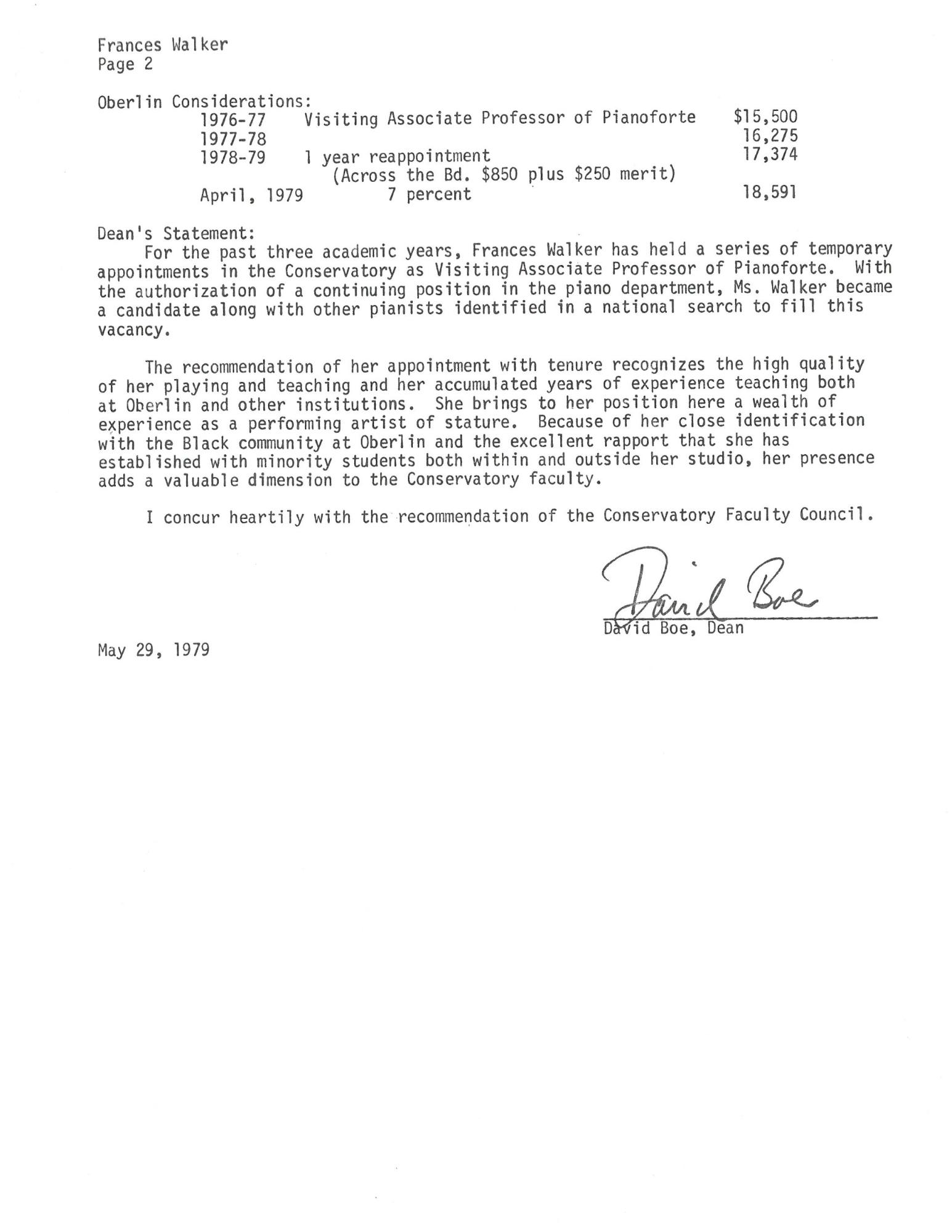|
|
FRANCES WALKER ASSOCIATE PROFESSOR OF PIANOFORTE
Recommended Action: Tenure
Married[2] 1 Child
Born: March 6, 1924
Education: B.M. Oberlin, 1945[3] M.A. and Professional Diploma, Columbia University, 1971 Study with Rudolph [Rudolf] Serkin and Miecyslaw [Mieczyslaw] Horszowski at Curtis Institute of Music and Robert Goldsand at Manhattan School of Music
Performing and Teaching Experience: Assistant Professor of Music, Barber-Scotia College,[4] Concord, N.C., 1947-1948 Assistant Professor of Music, Tougaloo College, Tougaloo, Miss., 1948-49 Instructor (Piano), Third Street Music School Settlement, New York City, 1957-66 Organist, Westminster Presbyterian Church, Jamaica, N.Y., 1965-68 Pianist-in-Residence and Assistant Professor of Music, Lincoln University,[5] Pa., 1968-72 Assistant Professor, University of Delaware, 1972-73, Master Class, summer 1973 Assistant Professor, Rutgers University-Newark, 1972-76 Three concerts at Carnegie Recital Hall Three concerts at Town Hall[6] Brooklyn Museum Radio Station WNYC Isabella Stewart Gardner Museum in Boston Corcoran Gallery National Gallery Kennedy Center Phillips Collection in Washington, D.C. Many schools, colleges, museums, and libraries. Europe – Amsterdam, London, Berlin
March 13, 1977 Performed Prokofieff [Prokofiev] Third Piano Concerto with the Symphony of the New World at Carnegie Hall July 8, 1977 Performed compositions of Black composers on Radio Station WCLV-FM, Cleveland August 23, 1977 First Water presents Black Perspectives in the Arts, One Times Square, New York City; Piano Soundtrack by Frances Walker January, 1978 Two record album – 24 Negro Melodies by Samuel Coleridge Taylor; Seven Traceries by William Grant Still
Recording Artist for Silhouettes in Courage
Carnegie Recital Hall recital Sept. 15, 1975 “Bicentennial Program: The Music of Black American Composers”[7]
Opening Concert, Oberlin Conservatory Bi-centennial year. Program of Black American composers.
Honors: Pi Kappa Lambda[8]
Frances Walker Page 2
Oberlin Considerations: 1976-77 Visiting Associate Professor of Pianoforte $15,500 1977-78 16,275 1978-79 1 year reappointment (Across the Bd. $850 plus $250 merit) April, 1979 7 percent $18,591
Dean’s Statement: For the past three academic years, Frances Walker has held a series of temporary appointments in the Conservatory as Visiting Associate Professor of Pianoforte. With the authorization of a continuing position the piano department, Ms. Walker became a candidate along with other pianists identified in a national search to fill this vacancy.
The recommendation of her appointment with tenure recognizes the high quality of her playing and teaching and her accumulated years of experience teaching both at Oberlin and other institutions. She brings to her position here a wealth of experience as a performing artist of stature. Because of her close identification with the Black community at Oberlin and the excellent rapport that she has established with minority students both within and outside of her studio, her presence adds a valuable dimension to the Conservatory faculty.
I concur heartily with the recommendation of the Conservatory Faculty Council.
[Signed: David Boe] David Boe, Dean May 29, 1979 |
[1] Oberlin’s African-American Community and Student Development Program, 32-34.
[2] Walker-Slocum was married to Henry Chester Slocum (1924-1980). They met when she came to teach at Tougaloo College in Mississippi. It was illegal for interracial couples to get married in Mississippi at the time, so they went to New York City. Their relationship invited much scrutiny from their friends and families. Slocum worked as the Vice President with Equitable Life Assurance Society (Molly Kavanaugh, “Oberlin grad shares her memoir,” The Bowling Green News, Source, accessed 15 July 2016).
[3] Walker-Slocum attended Oberlin because it was the only college where, as a Black woman, she could earn a Bachelor of Music. She recalled there were very few black students, even fewer of whom were women. The segregation of black and white students in dormitories and the separation of male and female students was difficult for her. At Oberlin, Walker Slocum majored in piano with a minor in organ (Frances Walker-Slocum, A Miraculous Life (Bloomington, Indiana: AuthorHouse, 2006).
[4] Barber-Scotia College was founded in 1867 as an institution for Black women. The college became a four-year institution just before Walker-Slocum taught there and amended their charter to admit qualified students regardless of race or sex shortly after she left (Barber-Scotia College, Source, accessed 15 July 2016).
[5] Receiving its charter in 1854, Lincoln University was the first historically Black college in the United States to grant degrees (Lincoln University, Source, accessed 15 July 2016).
[6] Town Hall is a performance venue in New York City established by the suffragist group, The League for Political Education (The Town Hall, Source, accessed 15 July 2016).
[7] See Document 1 for Donal Henahan’s Bicentennial Program review in The New York Times.
[8] Pi Kappa Lambda is dedicated to honoring the highest achievements of music in education (Phi Kappa Lambda, accessed 28 July 2016, Source).

